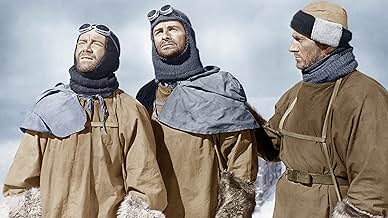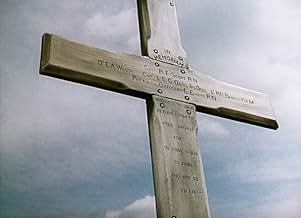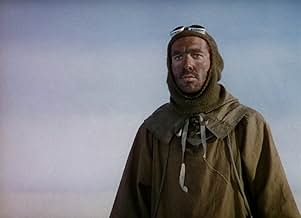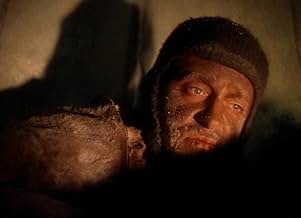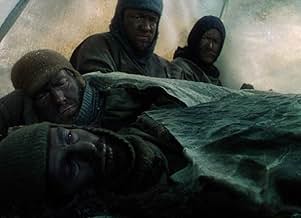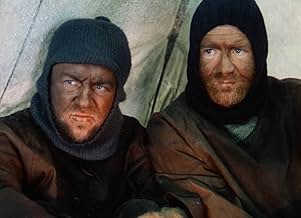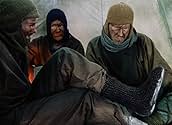AVALIAÇÃO DA IMDb
7,0/10
2,7 mil
SUA AVALIAÇÃO
Adicionar um enredo no seu idiomaThe story of British explorer Robert Falcon Scott's 1912 expedition and his quest to be the first to reach the South Pole.The story of British explorer Robert Falcon Scott's 1912 expedition and his quest to be the first to reach the South Pole.The story of British explorer Robert Falcon Scott's 1912 expedition and his quest to be the first to reach the South Pole.
- Direção
- Roteiristas
- Artistas
- Indicado para 1 prêmio BAFTA
- 1 vitória e 2 indicações no total
James McKechnie
- Surgeon Lt. E.L.Atkinson R.N.
- (as James Mc Kechnie)
- Direção
- Roteiristas
- Elenco e equipe completos
- Produção, bilheteria e muito mais no IMDbPro
Avaliações em destaque
There have recently been a lot of dramatised and documentary programmes on UK terrestrial and satellite TV on the pioneering polar explorers, erstwhile rivals and colleagues Scott & Shackleton so I was keen to view this British made dramatisation of the former's doomed 1912 expedition to the South Pole. I was not disappointed. It is obviously difficult to maintain cinematic excitement for the viewer of what is basically a long march (a similar problem as in "The Spirit of St Louis" and "The Old Man & the Sea"), but the true to life tragedy here proves compelling in the end. Jack Cardiff's colour photography is splendid and I was surprised to observe so few "process" shots for a film from the 1940s, given the scale of the task here. John Mills is excellent in the key role of Commander Scott but the supports are all excellent, many of them chosen for their physical similarity to their real life counterparts - Mills too bears a more than passing likeness of physiognomy to Scott. In the post - war climate, Britain obviously sought comfort and inspiration from past heroes as the country rebuilt itself in economic austerity and Scott must have been an ideal model for glorification. Regardless of sniping comments from historians about Scott's poor planning, the film quite rightly avoids judgements and asks the viewer to recognise and admire the human heroism of these gallant men. There is surely no more tragic sacrifice in all exploration than Oates' "I'm going outside, I may be gone some time" - exit and the movie captures this moment with the necessary pathos, later repeating the sensitivity as Scott and his last two colleagues expire with the so near and yet so far "11 miles" on their freezing lips. The Vaughan-Williams music is suitably sweeping and elegiac. One wonders why Hollywood ignored the film at the Academy Awards of 1948, certainly the acting, cinematography and music, to name but three, were worthy of recognition. I wonder if anyone would remake it in the modern era as we approach the centenary of the triumph and tragedy of Scott's expedition. Are you listening Peter Jackson...?
Although it verges on being a hagiography and cannot be considered to be historically accurate (what historical film is?), Scott of the Antarctic is a beautifully shot film with a great score and a solid cast. Some of the equipment from the actual expedition was used as props.
One of the other commentators on here makes mention of various failings of Scott's. Skis were depoted on the plateau due to poor surface conditions, as it was easier to haul without them and to carry them would have meant a considerable extra weight. Scott's own team depoted their skis, but went back for them when the conditions improved they did after all have an extra 200 miles to travel than Teddy Evan's team. Taff Evans wasn't abandoned on the Beardmore: he was suffering from possible brain damage and unable to pull the sledge. Considering that they all faced death if they didn't make the next depot in time, the other expedition members went on ahead with the intention of letting him catch up, whereupon he collapsed and died. Out of Teddy Evans's returning party only Evans himself came down with scurvy as he refused to eat either seal or pony meat for months. The other two members of his team, Crean and Lashly, didn't come down with scurvy and when the bodies of Scott and his men were discovered, the signs of scurvy were not visible on them either.
Nansen DID use dogs on his attempt at reaching the North Pole in 1893-95, although his earlier crossing of Greenland was done by manhaul. Scott already had decided to take skis on his expedition BEFORE he met Nansen in Norway, as he had gone there to buy the skis and test the motorised sledges. In fact it was he showed Nansen his locally purchased skis that the great man suggested Scott taking Gran with him. Gran DID teach Scott's men the basics of skiing on the pack ice on the way south. Scott himself was as good a skier as the average Norwegian. There is no evidence of an affair between Kathleen Scott and Nansen as on the occasion in question she was staying with American friends, not in the hotel with Nansen. According to the evidence they were good friends and nothing more.
One of the other commentators on here makes mention of various failings of Scott's. Skis were depoted on the plateau due to poor surface conditions, as it was easier to haul without them and to carry them would have meant a considerable extra weight. Scott's own team depoted their skis, but went back for them when the conditions improved they did after all have an extra 200 miles to travel than Teddy Evan's team. Taff Evans wasn't abandoned on the Beardmore: he was suffering from possible brain damage and unable to pull the sledge. Considering that they all faced death if they didn't make the next depot in time, the other expedition members went on ahead with the intention of letting him catch up, whereupon he collapsed and died. Out of Teddy Evans's returning party only Evans himself came down with scurvy as he refused to eat either seal or pony meat for months. The other two members of his team, Crean and Lashly, didn't come down with scurvy and when the bodies of Scott and his men were discovered, the signs of scurvy were not visible on them either.
Nansen DID use dogs on his attempt at reaching the North Pole in 1893-95, although his earlier crossing of Greenland was done by manhaul. Scott already had decided to take skis on his expedition BEFORE he met Nansen in Norway, as he had gone there to buy the skis and test the motorised sledges. In fact it was he showed Nansen his locally purchased skis that the great man suggested Scott taking Gran with him. Gran DID teach Scott's men the basics of skiing on the pack ice on the way south. Scott himself was as good a skier as the average Norwegian. There is no evidence of an affair between Kathleen Scott and Nansen as on the occasion in question she was staying with American friends, not in the hotel with Nansen. According to the evidence they were good friends and nothing more.
The first thing to remember is that Scott fouled up mightily in his attempt to be the first to reach the South Pole in 1912. He was stubborn, rather arrogant, yet malleable to the wishes of his wife. When his diaries were found on his frozen remains they were in fact later edited and altered by his wife (and the publisher) to depict Scott as a Great Heroic Figure. That was a lie; the depiction of him in the movie is a lie. And in recent years the unedited diaries were released proving the old myth was not the reality. It should be added the U.S. polar explorer Richard C. Byrd was an even bigger fraud - as his recently released personal notes also demonstrated.
This film is generally well done, and the Antarctic (actually Greenland, I believe) scenery is spectacular. The very slow deterioration of Scott's team is fascinating to see; their heartbreak upon viewing Raoul Amundsen's Norwegian flag flying over the Pole in the distance - meaning they had lost the race to the greatest of all explorers - is palpable. From then on it becomes a matter of survival and getting back home. Bit by bit the elements wear them down - untill they can finally go on no longer. When one says "I don't want to wake up tomorrow" with the wind howling just outside their little tent as they try to eat a morsel of cold food. . . you know it's over for them. Heartbreaking.
BUT THE CAUSE OF THE DISASTER IS NOT DELINEATED!! WHY did it happen? Bad luck? Scott's decision not to rely only on sled dogs? Yes. But his planning and leadership was also flawed badly - and that was not shown, as mentioned above.
I had no particular problem with the acting. It could possibly have been more emphatic and emotive, but then I assume the English were indeed as stoic as depicted in the film. Mills' understated Scott is to be expected as part of the MYTHICAL version of Scott - the REAL Scott I have no doubt was more emotional and weaker, as seen in the uneditied diary.
All in all, a moving film worth seeing - so long as you know this is not the reality of the Scott expedition but the cleansed version to make Scott and company as heroic as possible. If you want a better Arctic film try "The Red Tent", and check the reviews on the IMDb for background on it.
This film is generally well done, and the Antarctic (actually Greenland, I believe) scenery is spectacular. The very slow deterioration of Scott's team is fascinating to see; their heartbreak upon viewing Raoul Amundsen's Norwegian flag flying over the Pole in the distance - meaning they had lost the race to the greatest of all explorers - is palpable. From then on it becomes a matter of survival and getting back home. Bit by bit the elements wear them down - untill they can finally go on no longer. When one says "I don't want to wake up tomorrow" with the wind howling just outside their little tent as they try to eat a morsel of cold food. . . you know it's over for them. Heartbreaking.
BUT THE CAUSE OF THE DISASTER IS NOT DELINEATED!! WHY did it happen? Bad luck? Scott's decision not to rely only on sled dogs? Yes. But his planning and leadership was also flawed badly - and that was not shown, as mentioned above.
I had no particular problem with the acting. It could possibly have been more emphatic and emotive, but then I assume the English were indeed as stoic as depicted in the film. Mills' understated Scott is to be expected as part of the MYTHICAL version of Scott - the REAL Scott I have no doubt was more emotional and weaker, as seen in the uneditied diary.
All in all, a moving film worth seeing - so long as you know this is not the reality of the Scott expedition but the cleansed version to make Scott and company as heroic as possible. If you want a better Arctic film try "The Red Tent", and check the reviews on the IMDb for background on it.
The Ealing Studios production `Scott of the Antarctic' is a work of art and an inspiration to human achievement. The film depicts the polar explorers of the Second Scott Antarctic Expedition (1910-1913). They are portrayed first as pygmies against the terrible backdrop of the ice continent, then as dauntless giants within the enclosed spaces of their fragile tents as they await their certain death.
The mood of the film is High Victorian, although strictly speaking the setting is Late Edwardian. Edward Adrian Wilson, the artist, played by Harold Warrender, is the quintessential gentleman naturalist. As the film begins, Wilson is shown in the summery garden of his tranquil country homestead in England, meticulously creating a scientific illustration of a mounted bat. At the end, when Wilson is among the few remaining explorers who face frozen death in their wind-whipped tent, his spirit drifts away to his English home.
The Victorian faith in mechanisms is brought forth by close up shots of distance-measuring wheels that are attached to the backs of clumsy man-drawn sledges, and by the heroic but flawed powered tractors that break down in the awful cold.
The film invites the viewer to arrive at his or her own conclusions about the character of Captain Scott. The film makes no judgments - it merely portrays Scott through the superb acting of John Mills.
`Scott of the Antarctic' is a timeless film about eternal values: human endeavor, achievement and triumph.
The mood of the film is High Victorian, although strictly speaking the setting is Late Edwardian. Edward Adrian Wilson, the artist, played by Harold Warrender, is the quintessential gentleman naturalist. As the film begins, Wilson is shown in the summery garden of his tranquil country homestead in England, meticulously creating a scientific illustration of a mounted bat. At the end, when Wilson is among the few remaining explorers who face frozen death in their wind-whipped tent, his spirit drifts away to his English home.
The Victorian faith in mechanisms is brought forth by close up shots of distance-measuring wheels that are attached to the backs of clumsy man-drawn sledges, and by the heroic but flawed powered tractors that break down in the awful cold.
The film invites the viewer to arrive at his or her own conclusions about the character of Captain Scott. The film makes no judgments - it merely portrays Scott through the superb acting of John Mills.
`Scott of the Antarctic' is a timeless film about eternal values: human endeavor, achievement and triumph.
OK, we've heard a lot about the "real" history and the debate over whether Scott was a hero or a complete imbecile. Whatever the truth is and whatever revisionist or hagiography history is being peddled, "Scott Of The Antarctic" is a beautifully made film: One of the best looking early colour films which evokes a bye-gone era and is strangely compelling and haunting at the same time. The music by Vaughn-Williams, the greatest British classical composer of his time, is powerful and, again, haunting. In some scenes, they've recreated exactly some of the photos taken during the Scott expedition. The casting is spot on; look at the original photos and Millsy is uncannily like Scott, Kenneth More is Teddy Evans, Reginald Beckwith and James Robertson Justice do their real counterparts well and John Gregson, in one of his first film roles, captures Tom Crean perfectly (compare his performance with Paul McGann's Crean in "Shackleton", which was pretty good). Many film critics feel that "Scott of the Antarctic" was somewhat robbed at the 1949 Oscars.
Você sabia?
- CuriosidadesCaptain Scott's log and many of the personal effects of the explorers were loaned by The British Museum to add to the authenticity of this near-documentary.
- Erros de gravaçãoNo one's breath is ever visible in the Antarctic.
- Citações
Capt. L.E.G. Oates: I'm just going outside; I may be away some time.
[as he leaves tent for certain death]
- Cenas durante ou pós-créditosRalph Vaughan Williams, then revered as Britain's greatest living composer, has an official credit consisting only of his surname, 'Vaughan Williams'.
- ConexõesFeatured in Antarctica (1991)
- Trilhas sonorasWill Ye No Come Back Again?
(uncredited)
Traditional Scottish tune, and lyrics by Lady Carolina Nairne (as Carolina Oliphant, Lady Nairne)
Heard as the ship leaves New Zealand
Principais escolhas
Faça login para avaliar e ver a lista de recomendações personalizadas
- How long is Scott of the Antarctic?Fornecido pela Alexa
Detalhes
Bilheteria
- Orçamento
- £ 2.370.000 (estimativa)
- Tempo de duração
- 1 h 51 min(111 min)
- Proporção
- 1.37 : 1
Contribua para esta página
Sugerir uma alteração ou adicionar conteúdo ausente

